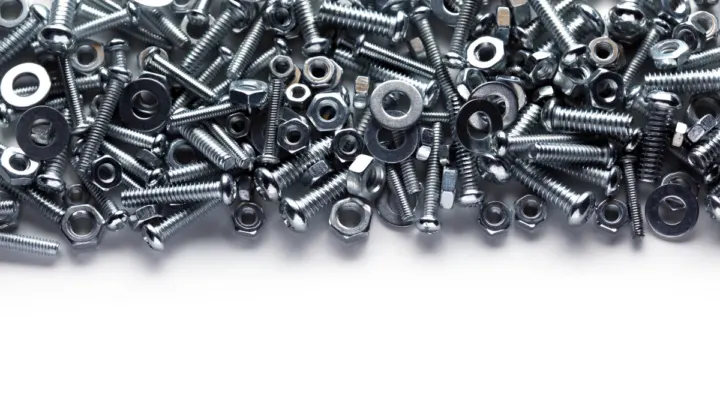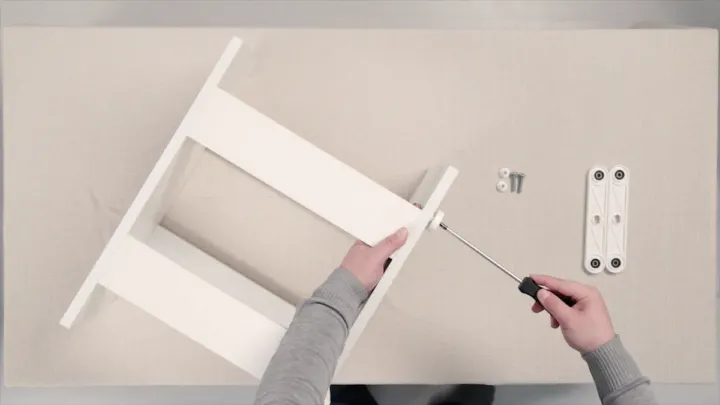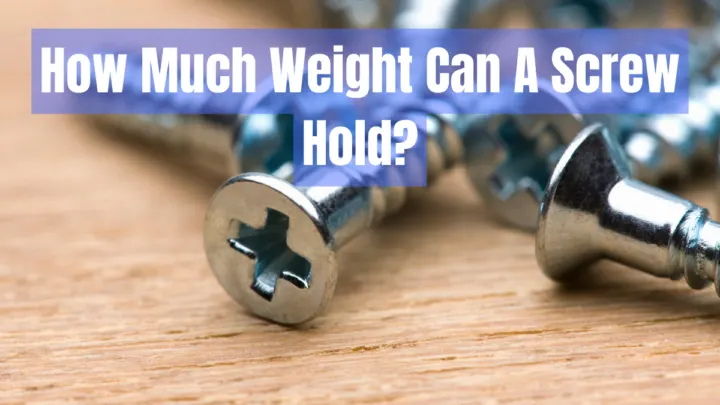Regardless of whether you’re working in construction or need to take care of some household repairs, screws are very reliable, but how much weight can one hold?
When you pick out screws, you will find that there is more than just one type to consider, as they can vary in characteristics and quality.
The type of screw that you use as well as how you install it can make all the difference in how much weight it will ultimately support.
Most screws will hold anywhere from 80-100lbs of weight. However, this number can fluctuate based on the screw’s length, width, quality, thread type, how it was installed, and the type of impact that the screw has to withstand.
If you have got your power drill out and are ready to get some work done, you may find yourself wondering if the screw that you are about to use can handle the task at hand.
Screws are universally used across so many different industries and there is a reason for that – they are reliable and dynamic.
When implemented properly, a screw can support a significant amount of weight considering its small size.
However, how much weight it can ultimately support will vary based on a number of different factors, which is why you want to be equipped with the knowledge necessary to ensure that the screw you are using is up for the job.
To help you understand this further, we are going to take a closer look at exactly how much a screw can hold and the factors that influence its weight capacity.
How Much Weight Can a Screw Hold?
Instead of simply drilling holes and hoping for the best, you should first try to assess all of the factors that are going to give your screw an optimum hold.
There is a lot that you can do to achieve a maximum weight capacity from a single screw.
Some of this is going to have to do with the specs and condition of the screw, but equally as important is how you install it.
If you cover all of your bases and install your screw properly, you should have no problem getting at least 80 – 100 lbs of support from just a single screw. Let’s dive into the different factors that you should be aware of.
Screw Length and Width
The length of the screw is one of the most important characteristics that you need to consider.
When drilling in the screw, it needs to be able to reach an optimum length into the wall so that it can properly anchor itself.
In general, you will find that the longer the screw, the more support that you are able to get out of it – enabling you to maximize its weight load capacity.
For most situations, you want to use a screw that is at the very least 1 inch in length, as you will not get much support from anything less than this.
Ideally, you should try to use screws that are 2 inches long (or more) when appropriate.
If you are working with something that is very light, this is not as important but if you are dealing with a heavy object, a longer screw is going to be a safer and more reliable option.
You also want to consider the width of the screw that you are using.
A wider screw is going to be able to handle more weight – making them better for heavy objects.
By using a long and wide screw for your task, you can push its weight load capacity to its limits with total confidence.
Just make sure that the screw was installed properly and that you are aware of the weight of the object that it needs to support.

Screw Quality
Not all screws are made equal. If you want to get the most amount of weight possible out of a screw, you should choose a quality option that was designed for heavy loads.
This generally has to do with the material that the screw was made out of.
Cheap screws will give you a fraction of the support that a quality screw can deliver.
So, if you are dealing with heavy objects it is best to go with a material that can handle the task at hand.
More often than not, you will see screws that are made from steel, as this is a reliable metal that is also quite affordable.
However, steel can vary in its quality – with cheap options supporting less weight than expensive ones.
If you want a quality screw, we would recommend getting stainless steel, as this is a very reliable metal for supporting weight. You will see screws made out of the following metals
- Brass
- Titanium
- Steel
- Stainless Steel
- Silicon bronze
Each screw material is useful but if you want it to hold the most amount of weight possible, stainless steel and silicon bronze are the best quality options that you can get.
These materials are not only incredibly strong but they are also resistant to rust and corrosion – enabling them to hold heavier loads for longer periods of time.
Thread Type
When picking out a screw for maximum weight capacity, you want to consider the type of material that you are going to be drilling into.
The material that you are working with will help you pick out the right threat type for your screw.
The two main thread types seen on common screws are either fine or coarse. One thread is not superior to the other, as they both can achieve a high weight capacity.
What determines how strong the hold will be for each thread type is the material that you use it with.
If you are drilling into a soft material such as wood or drywall, then a coarse thread is going to be much better suited for the job.
Whereas a fine thread is going to allow a better hold for hard materials like metals.

Installation
How you install your screws can be vital to how much weight they can hold.
This mainly has to do with your ability to assess the screw’s specs and the material that you plan on drilling it into.
The more that you understand about the material and its consistency, the better equipped you will be to conduct a proper installation.
Naturally, this also has to do with being able to gauge the quality of the screw itself, as well as its specs such as length and width.
Installing your screws with anchors can be a major boost for maximizing weight capacity.
Anchors are used for support.
The way they work is that you first install the anchor to get a tight fit inside of the material.
Once the anchor is in place, you then install the screw inside of the anchor.
Anchors can vary depending on the material that you are working with and each one will offer a different level of support.
Some of the most common anchors used are made out of:
- Plastic
- Metal
- Wood
By using an anchor with your screw installation you can push the weight capacity that it can hold considerably higher than the standard 80 to 100 lb figure – with some screws taking on thousands of pounds single-handedly.
Force
To get as much hold out of your screw as possible, you should assess the kind of force that it will need to withstand.
Depending on how the screw is being used it is likely being impacted by either lateral or withdrawal forces.
If the force that is straining the screw is from materials that slide away from one another, this would be classified as a lateral force.
To maximize the weight support for this kind of force, you want to utilize a wider screw.
When the force is trying to separate the materials, then you are dealing with a withdrawal force.
For this kind of force, you want to use a screw that has a reasonable amount of length.
The key is to reach deep into the material so that you can make contact with the backing board.
Having multiple screws can often be advantageous when you want to get as much support as possible, as this can considerably increase your maximum weight threshold.
This is especially important if you are cutting the weight expectancy of an object close and want to mitigate any risk of collapse.
Summing Up How Much Weight Screws Can Hold
As long as you have a screw that is long and wide enough, and it’s installed correctly, screws can generally hold anywhere from 80-100lbs of weight. This allows for a multitude of things to be hung off of it.
If you want screws to hold even more, make sure you pick a wide one that is able to be screwed in quite a few inches into the wall.


